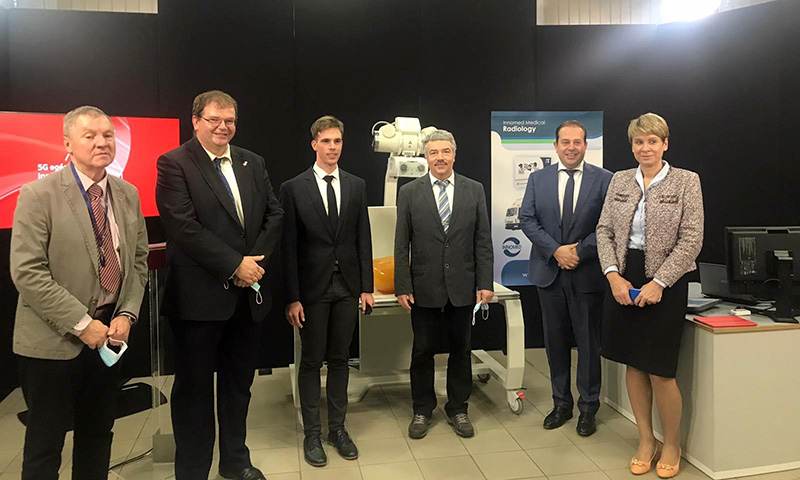A student is the first in Hungary to transmit an X-ray image via 5G
 Róbert Varga, a student of Széchenyi István University in Győr, has transmitted high-resolution X-rays for the first time in Hungary via a 5G network, for which Innomed Medical, Vodafone Hungary and the National Media and Info-Communications Authority (NMHH) provided professional and technological assistance. This healthcare innovation opens up new perspectives for different remote diagnostic procedures.
Róbert Varga, a student of Széchenyi István University in Győr, has transmitted high-resolution X-rays for the first time in Hungary via a 5G network, for which Innomed Medical, Vodafone Hungary and the National Media and Info-Communications Authority (NMHH) provided professional and technological assistance. This healthcare innovation opens up new perspectives for different remote diagnostic procedures.
Source: National Media and Info-communications Authority (NMHH)
Published: 24 November 2020

Endre Dévai, President of Innomed Medical Zrt., Péter Vári, Deputy Director General of NMHH, Róbert Varga, student of István Széchenyi University, Dr Gábor Borbély, Head of the Telecommunications Department of the University, Gergő J. Budai, Vice President of Vodafone Hungary and Dr Janka Aranyos-Börcs, Director General of NMHH
Fast and efficient medical evaluation of findings made with medical imaging devices is vital - which is why Róbert Varga's healthcare innovation is of indisputable importance: the student of Széchenyi István University, Győr, was the first in Hungary to transmit high-resolution X-rays electronically via the Vodafone 5G network. “X-rays are usually taken on some external data storage medium (such as a flash drive) from the X-ray imaging device to the geographically distant detection device. The next-generation network, 5G, allows you to transfer large files quickly and efficiently, which is extremely important because in healthcare, even a few minutes spared can save lives.” said Róbert Varga, the developer of the idea.
Eliminating the need for an external data storage medium, this innovation makes it possible - via a so-called PACS server - for X-rays to be sent in a matter of seconds directly from the X-ray machine to detection workstations, which is important in the case of mobile screening units, for example. The student, who also won a TDK (Scientific Students’ Association) award with his project, developed and presented it to the public on the devices of Innomed Medical Zrt. and on Vodafone Hungary's 5G network. “The hospital is one of the most important institutions serving the needs of society, so I have been concerned with how to help the everyday lives of hospitals, doctors and patients. I believe that with the advent of 5G technology, the range of these possibilities will expand. Data should travel, rather than the doctor!” said Róbert Varga, who masterminded the idea.
“Our research and development institute, where not only the founding engineers but also young staff and students work, is looking for ways to the future. Our latest research is currently an easy-to-install and easy-to-disinfect, fast diagnostic tool that, thanks to its mobility, can even be used in crisis areas. Due to both its mobility and its ease of disinfection, this development is of particular relevance during the COVID-19 epidemic, as it can be easily erected, even in container hospitals. The device, incidentally, is a modular, low-dose, multi-purpose, battery-run linear layer imaging device (DTS) that takes just 10 seconds to create an image. The role of 5G technology is reflected in the transfer of large amounts of data generated during recording to the detection equipment. Via this project, Róbert Varga came together with Vodafone Magyarország Zrt and Innomed Medical Zrt. All three of us are interested in its successful implementation,” said Endre Dévai, President of Innomed Medical Zrt.
Vodafone Hungary has been at the forefront of the development of the new generation 5G mobile network, right from its inception: thanks to its 3500 MHz frequency set purchased in 2016, the company was the first Hungarian mobile operator to launch its open-air commercial 5G service in 2019 in the centre of Budapest. In April 2020, Vodafone Hungary acquired additional frequencies for its 5G mobile services at the frequency auction conducted by NMHH, thus starting the construction of the service provider’s island-like 5G network. Then in October this year it was announced that it would connect 5G at nearly 200 base stations, resulting in making the 5G service available to customers in almost the entire area of the capital city. The aim of the service provider is to make the next generation network geographically as widely available as possible in order to serve the interests of society to the maximum.
“I believe that the digitization of many industries can benefit from the knowledge and experience that is now available with next-generation 5G network development. It is extremely important for us to stand up for initiatives aimed at putting technology at the service of the public good, and to pay close attention to solutions that support the digitalisation of healthcare. It is a special pleasure for us to see that the new technology we provide is being grabbed and turned to the benefit of society by young talent. Congratulations to Róbert Varga for his amazing work!” said Dr. Gergő J. Budai, Vice Chairman of the Board of Vodafone Hungary.
“I vividly remember the long journey of negotiations we had to make for 5G’s benefits to be accessed in health, education and industry. Following professional discussions, NMHH implemented a spectrum sale that encourages service providers and technology users to work in partnership.” - we were informed by Dr Janka Aranyos-Börcs, Director General of NMHH, who expressed her hope that more and more such collaboration would soon be established, strengthening and bringing closer together Hungary's info-communication and health care sectors, and thus also, in a broader sense, the country's economy. The General Director also congratulated Róbert Varga and at the same time recalled that the electrical engineering student’s TDK lecture on this topic last week was recognized with a special award from NMHH.











